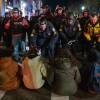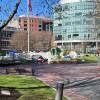Hundreds of pro-Israel demonstrators rallied on the steps of a Massachusetts Institute of Technology building in Cambridge Friday, calling on the university to shut down a pro-Palestine encampment across Massachusetts Avenue, where students continue to protest the university’s ties to the Israeli military.
The protest was organized by the Israel American Council of New England, which brought their own stage and sound system to campus. Students, faculty and community members addressed the audience, surrounded by Israeli flags and pictures of people held hostage by Hamas, as the crowd repeatedly chanted “free them all,” and “Am Yisrael Chai.”
“We came here today in very large numbers to remind everyone that we are loud, we are proud, and we are unapologetically Zionist,” MIT post-doctoral fellow Dvir Harris said from the stage. “Their [pro-Palestine protesters’] rabid antisemitism, combined with poor leadership of our institutions, have awakened the Jewish community to fight back against moral and legal injustices. Are you paying attention yet? We are just getting started.”
Speakers included Shabbos Kestenbaum, a graduate student at Harvard who sued the university in federal district court in January, accusing the university of becoming a “bastion of rampant anti-Jewish hatred and harassment.”
Hundreds of counter-protesters have gathered on the steps of MIT, separated from the pro-Palestinian encampment across the street by a police barricade. They're calling on MIT to bring Cambridge police in to crack down on the encampment and shut down pro-Palestine protests pic.twitter.com/X77cqkPuu8
— Tori Bedford (@Tori_Bedford) May 3, 2024
“We are all gathered here today to affirm our values, to affirm our democratic American and Jewish sense of rights and responsibilities,” Kestenbaum said to the crowd Friday. “To my classmates, to my professors who support Hamas, who support the Houthis, who support Hezbollah, who are chanting ‘globalize the intifada’ and ‘resistance is justified‘: No keffiyeh nor mask will be able to cover your unvarnished Jew hatred, your disdain for our democratic values, nor our insistence that we wear our kippahs and Star of Davids with pride.”
Dozens of Cambridge police officers stood between barricades along Massachusetts Avenue, separating the pro-Israel counter-protesters from the pro-Palestine encampment, which officers had fenced in and concealed with privacy screens Friday morning.
As the rally came to a close, organizers thanked state, Cambridge and MIT police and closed with a performance of the Hatikvah, or Israeli national anthem.
Or Hen, a physics professor at MIT, encouraged the crowd to move out without approaching the pro-Palestinian encampment just yards away. “We will dance, we will sing, and we will not engage,” he said.
Despite his guidance, several counter-protesters approached the walled-in encampment, waving Israeli flags and shouting through megaphones at the several hundred protesters inside.
A speaker from the counter-protest, Shabbos Kestenbaum demands to enter the encampment. A Cambridge police officer insists on accompanying him inside for his own safety pic.twitter.com/jA5S03fQJ1
— Tori Bedford (@Tori_Bedford) May 3, 2024
Confronted with a wall of protesters blocking the entrance to the encampment, Kestenbaum shouted at protesters to “get the f*** out of my way.” After a Cambridge police officer insisted on escorting him through the encampment, Kestenbaum pleaded, “If I walk through and there’s violence, it’s not because of me. If there is violence, it’s because they put their hands on me and they should be punished,” he said. “Not a Jew wearing a kippah with an American flag.”
Kestenbaum’s brief walk through the encampment did not result in violence. He was largely ignored by the group, who continued to sing, chant and sit on the grass.
Jacob Hirschman wore a kippah and chanted along with students singing pro-Palestinian chants Friday. Hirschman, who lives locally, told GBH News that he was initially wary to join his girlfriend — who attends MIT — at the protest since he’d heard it would be dangerous.
“I came here, as a Jew, to see if the horror stories I am being told are true, only to discover that they are not,” he said. “I’m standing here in total peace, without a police escort, and not finding that I am in immediate peril, which I’ve been told for the last six months that I would be. Every time I go into a space like this, I am concerned that I’m going to feel that peril, but I never have.”
Jewish pro-Palestinian protester Itai Squires-Kasten, a Cambridge resident, says he joined the encampment to learn more about the ongoing demonstration after discussions with pro-Israeli members of his Cambridge synagogue.
“The narrative of the counter-protest was that we need to show Jewish students that they are not alone,” he told GBH News. “I am also here to show Jewish students that they are not alone, because the majority of Jewish student organizers and Jewish people who are anti-war are marginalized and endangered.”
Shara Bhuiyan, a protest organizer and senior in MIT’s electric engineering and computer science program, says the counter-protest was an attempt to “distract” from students’ demands for the university to cut ties with Israel’s Ministry of Defense and divest from companies that work with the Israeli military.
“We’re here peacefully protesting, and there’s people out here trying to agitate us, but that’s not something we’ll give in and respond to, because engaging only distracts from the real issues,” she said. “As MIT students, we’re standing for an end to the genocide, an end to the occupation and to MIT’s complicity in this genocide by making killer drones and other projects that the Israeli Ministry of Defense chooses to conduct. That’s why we’re defending this camp right now.”
More Local News
Since 2015, MIT has received over $11 million in authorized research funding from the Ministry of Defense of Israel, with nearly $4 million of these contracts spent, according to university financial data published by Scientists Against Genocide, a pro-Palestinian activist group.
In an emailed statement to GBH News Friday, MIT spokesperson Kimberly Allen declined to answer questions about the university’s financial relationship with Israel’s Ministry of Defense.
“I am not going to compromise the academic freedom of our faculty, in any field of study. Our faculty represent a wide range of viewpoints that are appropriately expressed in a university dedicated to broadening our students’ minds,” MIT President Sally Kornbluth said in a statement shared with GBH News Friday. “And faculty routinely work with colleagues around the world, including in Israel — and all sponsored research on our campus is openly shared, publishable, and freely available to investigators everywhere.”
The university’s emphasis is on “a thoughtful and safe pathway toward resolution,” Allen wrote, adding that Kornbluth “asks everyone to keep the peace.”
MIT student-turned-professor Nancy Kanwisher came out with several other faculty members Friday to monitor the situation. She recalled taking part in campus protests against the U.S. military’s intervention in Central America, pushed for MIT to divest from South Africa’s system of apartheid and joined protests opposing the war in Iraq.
“The students were right in every one of those cases,” she said. “We look back with a long arc of history and you cannot deny they were right every time.”
Police did not conduct arrests during the counter-protest, and as the afternoon turned to evening, faculty members and student activists on both sides remained engaged in peaceful — if tense — conversations.













